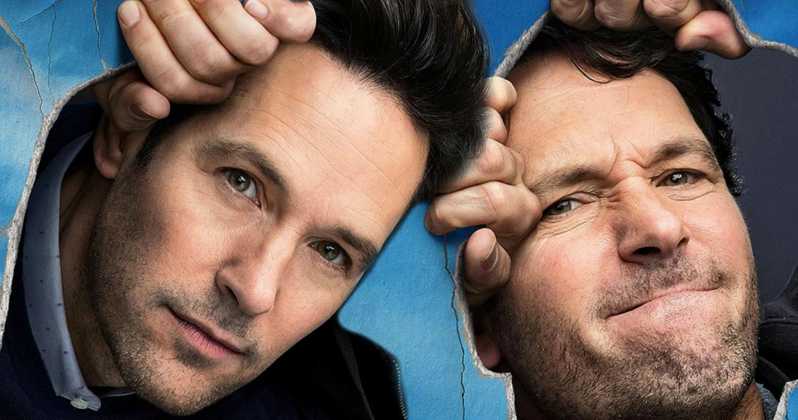Self-hate is almost an even stranger animal in the twenty-first century. For it’s so intrinsically linked to narcissism and the constant need to compare oneself to others that the line becomes oddly blurred. This is at least part of what makes one of Netflix’s latest series, Living With Yourself, so fascinating to watch. For its lead character, Miles Elliot (Paul Rudd), undergoes a “spa procedure” recommended by an inexplicably reinvigorated co-worker that turns out to be a cloning front. What’s meant to happen is that the Asian duo running the operation is supposed to kill the “original” and let the rejuvenated copy go out into the world with a blithe unawareness of all the sentiment of previous emotional baggage and decay.
Of course, they don’t actually manage to kill Miles’ “original” for some unexplained reason. And in Miles’ case, his lack of zest for life or even his wife, Kate (Aisling Bea), leaves him particularly un-jazzed about taking a jizz test to assure his virility. For like all couples of a certain age in New York (once a single person’s haven now overrun with family types), they–mainly she–become obsessed with starting a family, complete with moving to a generic house in the suburbs that’s still commutable to the city. Yet all that enthusiasm, as told through shifting perspectives that vary from the end of one episode to the beginning of another, wanes over a six-month period eventually told through a series of scenes of both Miles and Kate waking up with increasingly less eagerness and increasingly more signs of feeling the weight of an existential crisis on their backs. To make matters worse, Miles is so over the banality of his job that after killing a buzzing fly at his desk, he tells it, “You’re welcome.”
His workplace inadequacies are made all the more palpable with a celebration of Dan (Desmin Borges) “winning” the pitch from earlier that day at Friday’s (one of many gatherings at the chain that will ensue throughout the season). Sitting at the bar with his usual sheen of repressed rage, Miles asks him how he could sell out so easily. It’s then that Dan tells him about Top Happy Spa, which Miles grudgingly ponies up the $50,000 fee for (drained from the fertility fund, naturally). Initially disgusted with himself for believing Dan when he rolls up to the deserted strip mall (“across from Curves”), the sight of Tom Brady coming out of the spa is enough to convince him his purchase will be worth it. What’s he got to lose, after all? For he has no idea that the answer is himself. Soon coming to terms with meeting his better… whole.
And as he watches his clone live out his life with more zest and bravado than he ever had (for both come to a certain arrangement about how to make their doubledom work), Miles only seems to become more self-hating before realizing that he can achieve what Miles II is–because he is Miles II. So why does it feel so damned impossible to be plucky about anything? Well, probably because Miles II has all the memories without having actually experienced them. The pain of them that leaves Original Miles with a black cloud aura and a resigned slouch. Thus, maybe Miles II will always have an advantage over him.
Then again, as Kate makes him see by the end of the season, maybe there’s something to be said for the authenticity of agony. Of having endured the same history together, whereas Miles II wasn’t really there, is all ersatz perfection. This complicates things all the more when Miles II can’t seem to get the idea out of his head that Kate is his wife. Something he complains to on one of many visits to Maia’s (Alia Shawkat), the half-sister Original Miles never really talks to. It’s just one of the many ways in which Miles II surpasses Original Miles on the “people person” front. In fact, in many respects, the premise is built upon that which Dostoyevsky did long ago with The Double. Centered on a sniveling and unconfident government clerk named Yakov Petrovich Golyadkin, he is startled by the sudden appearance in the office of a man who looks exactly like him. Except, personality-wise, he is Golyadkin’s opposite in every way: adroit, extroverted and filled with pep that makes all of his co-workers and superiors like him. His nickname is ultimately Golyadkin Jr. And he soon sees fit to take over Golyadkin Sr.’s life in much the same way that Miles II does.
Original Miles’ frequent self-loathing (for both himself and the clone of himself) is, indeed, manifest in such The Double quotes as, “My God! What the hell-broth the devil’s concocted here! As for him, he is such a beast and ignoble man, so mischievous and wonton, so frivolous and sycophantic and grovelling, such a Golyadkin!” Just as in The Double, there is a period of peace between the two men before a war breaks out, a competition to see who can actually “do” his life better. Yet, in the end, what separates The Double from Living With Yourself (apart from the former being a literary masterwork and the latter being some faux pithy pop culture) is that Miles is soft on his clone. Sees it as an extension of the person he himself could actually become. He is no longer a source of salt in the wound but a beacon of promise for the future. Even if the “revelation” of the final episode is in no way, shape or form plausible–and smacks merely of a tactic to keep the show going for another season. Dostoyevsky would never pull such a stunt.






















